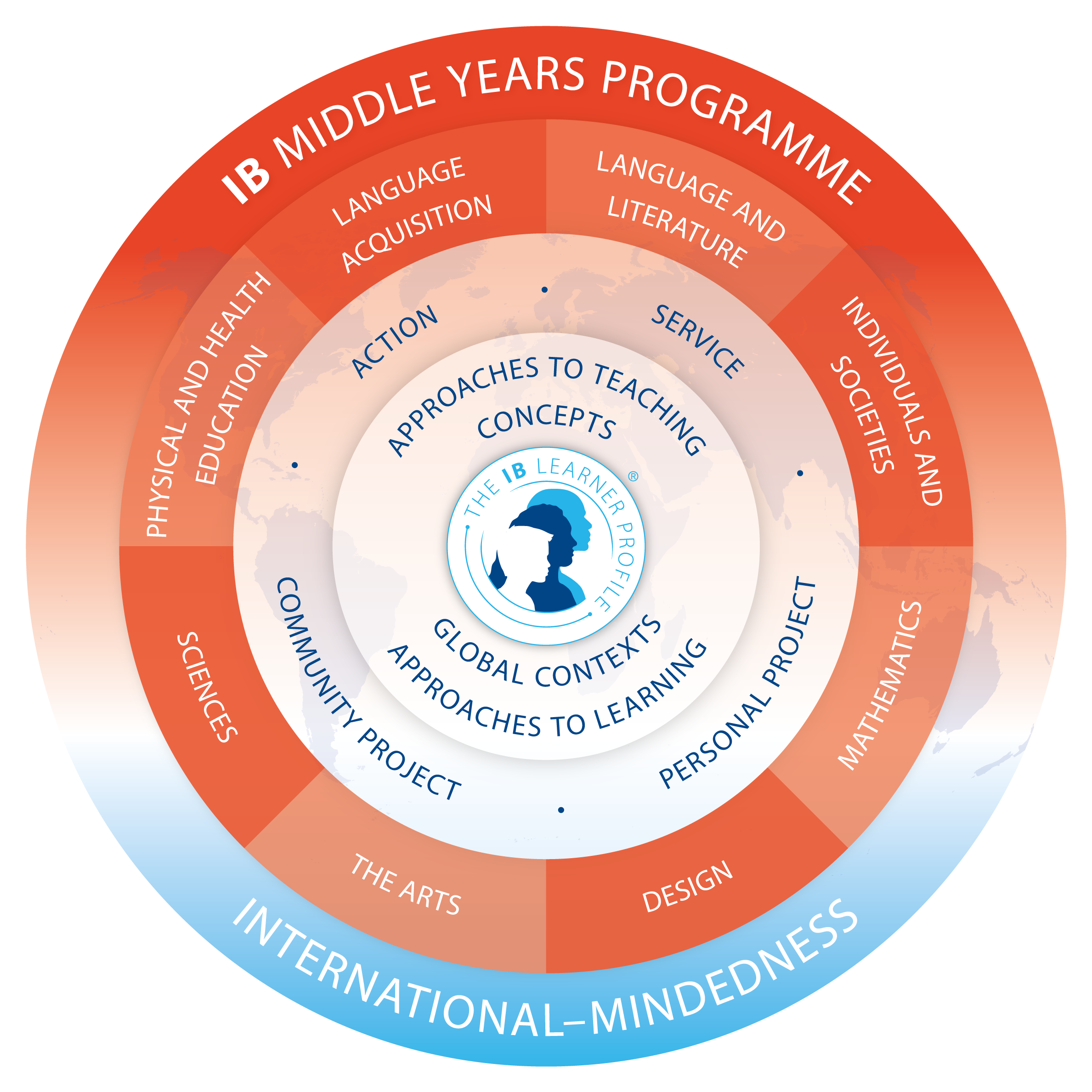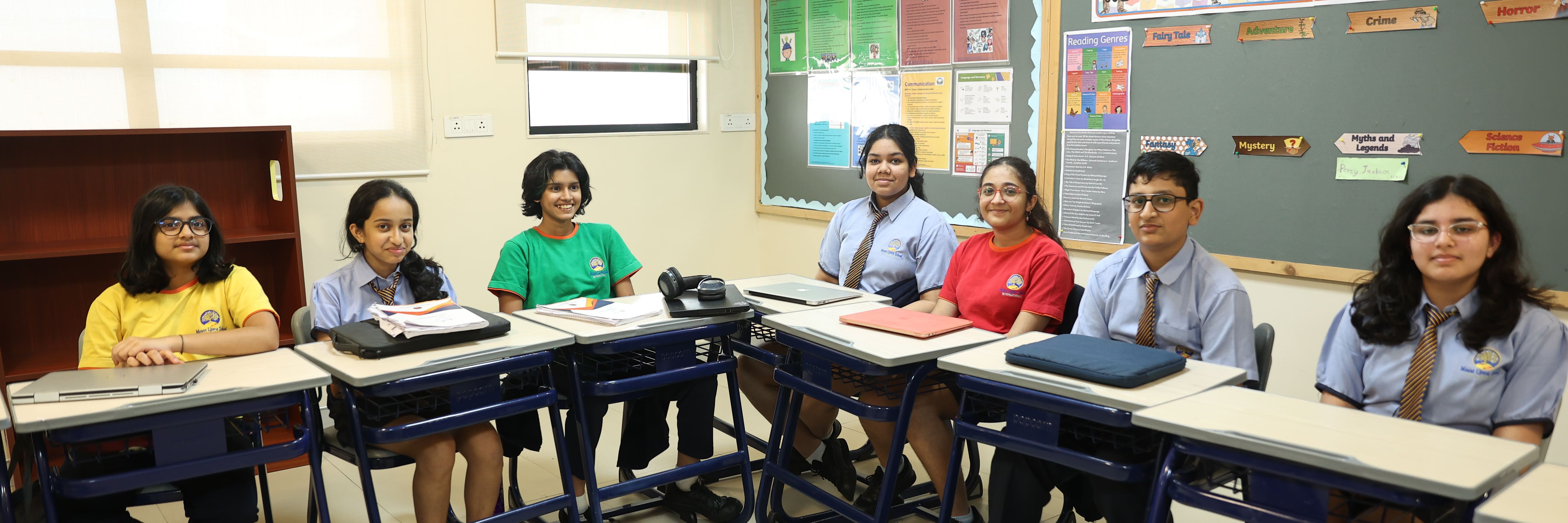 IB Middle Years Programme (MYP)
IB Middle Years Programme (MYP)
The MYP aims to develop active learners and internationally minded young people who can empathize with others and pursue lives of purpose and meaning.
The programme empowers students to inquire into a wide range of issues and ideas of significance locally, nationally and globally. The result is young people who are creative, critical, and reflective thinkers.
Research shows that students participating in the MYP:
- build confidence in managing their own learning
- learn by doing, connecting the classroom to the larger world
- outperform non-IB students in critical academic skills
- consistently have greater success in IB Diploma Programme examinations
- thrive in positive school cultures where they are engaged and motivated to excel
- develop an understanding of global challenges and a commitment to act as responsible citizens.
The MYP was revised in September 2014 to provide a more rigorous and highly flexible framework that powerfully integrates with local educational requirements. New industry-leading onscreen examinations and ePortfolios offer exciting opportunities for reliable, robust digital assessment of student achievement.
IB programme models highlight important shared features of an IB education.
- Developing the attributes of the learner profile
- Approaches to teaching and approaches to learning
- Age-appropriate culminating experiences
- An organized and aligned structure of subject groups or disciplines
- Development of international-mindedness as a primary aim and context for learning

In the programme model for the MYP, the first ring around the student at the centre describes the features of the programme that help students develop disciplinary (and interdisciplinary) understanding.
- Approaches to learning (ATL)-demonstrating a commitment to approaches to learning as a key component of the MYP for developing skills for learning.
- Approaches to teaching-emphasizing MYP pedagogy, including collaborative learning through inquiry.
- Concepts-highlighting a concept-driven curriculum.
- Global contexts-showing how learning best takes place in context.
The second ring describes some important outcomes of the programme.
- Inquiry-based learning may result in student-initiated action, which may involve service within the community.
- The MYP culminates in the personal project (for students in MYP year 5) or the community project (for students in MYP years 3 or 4).
The third ring describes the MYP's broad and balanced curriculum.
- The MYP organizes learning and teaching through eight subject groups: language and literature, language acquisition, individuals and societies, sciences, mathematics, arts, physical and health education, and design.
- In many cases, discrete or integrated disciplines may be delivered and assessed within a subject group: for example, history or geography within the individuals and societies subject group; biology, chemistry or physics within the sciences subject group.
- The distinction between subject groups blurs to indicate the interdisciplinary nature of the MYP. The subject groups are connected through global contexts and key concepts.
-
For further information about MYP subjects, check the following links:
- Language & Literature
- Language acquisition
- Individuals and societies
- Sciences
- Mathematics
- Arts
- Physical & Health Education
- Design
- Interdisciplinary leraning
- Personal Project
The programme has been developed with developmentally appropriate attention to:
- conceptual understanding
- learning and teaching in context
- approaches to learning (ATL)
- service as action (community service)
- language and identity
- learning diversity and inclusion.
For further information about the IB and its programmes, visit http://www.ibo.org
Subjects offered
| Subject Groups | MYP 1 | MYP 2 | MYP 3 | MYP 4 | MYP 5 |
|---|---|---|---|---|---|
| Language & Literature | English | English | English | English | English |
| Language Acquisition | French Or Hindi Or Spanish & Marathi | French Or Hindi Or Spanish & Marathi | French Or Hindi Or Spanish & Marathi | French Or Hindi Or Spanish & Marathi | French Or Hindi Or Spanish & Marathi |
| Individuals & Societies | Integrated Humanities | Integrated Humanities | Integrated Humanities | Integrated Humanities Or | Integrated Humanities Or |
| Geography | Geography | ||||
| Sciences | Integrated Sciences | Integrated Sciences | Integrated Sciences | Physics, Chemistry, Biology | Physics, Chemistry, Biology |
| Mathematics | Mathematics | Mathematics | Mathematics | Standard Mathematics Or Extended Mathematics | Standard Mathematics Or Extended Mathematics |
| Design | Digital Design & Product Design | Digital Design & Product Design | Digital Design & Product Design | Design (Digital Design & Product Design) Or Music Or Visual Arts Or PHE | Design (Digital Design & Product Design) Or Music Or Visual Arts Or PHE |
| Physical & Health Education (PHE) | Digital Design & Product Design | Digital Design & Product Design | Digital Design & Product Design | Design (Digital Design & Product Design) Or Music Or Visual Arts Or PHE | Design (Digital Design & Product Design) Or Music Or Visual Arts Or PHE |
| Arts | Music & Visual Arts | Music & Visual Arts | Music & Visual Arts | Design (Digital Design & Product Design) Or Music Or Visual Arts Or PHE | Design (Digital Design & Product Design) Or Music Or Visual Arts Or PHE |
| Physical & Health Education (PHE) | PHE | PHE | PHE | Design (Digital Design & Product Design) Or Music Or Visual Arts Or PHE | Design (Digital Design & Product Design) Or Music Or Visual Arts Or PHE |
| Social emotional learning (SEL) | SEL | SEL | SEL | SEL | SEL |
| Personal Sports (PS) | Students are given options | ||||

